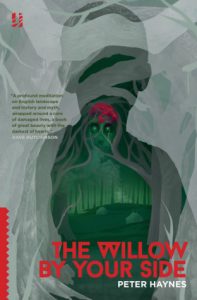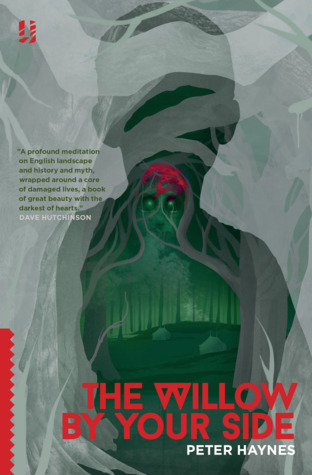Author Spotlight – Peter Haynes
Joining us for today’s Author Spotlight is Peter Haynes!
Peter Haynes hails from the wilds of Devon and currently lives in Birmingham, UK where he writes novels and short stories.His fiction has been published widely in print and online, and his debut historical fantasy novel The Willow By Your Side was published by Unsung Stories in 2018. You can find on him on Twitter @ManOfZinc
I am working my way through Gene Wolfe’s science fantasy Book of the Long Sun at the moment, which is the central tetralogy in his vast and complex Solar Cycle.
I love the texture of Wolfe’s writing, and I really felt his loss.
Okay, time to escalate things: reality warps and you suddenly find yourself leading a D&D-style party through a monster-infested dungeon. What character class are you, and what’s your weapon of choice?
While I like to imagine being a stealthy rogue puncturing kobold kidneys from the shadows, I’d likely be a Bard, heroically escaping the fight to weep into my tankard of mead back at the tavern, lamenting the loss of my (latest) party with an epic poem in thirty-seven parts.
Oh, I seem to have left my coin purse in my other cloak…
When you’re not trawling through dungeons, how do you like to work? (In silence, with music, or serenaded by the damned souls of a thousand dead shrimps? Do you prefer to type or to hand-write? Are you an architect or a gardener? A plotter or a pantser? D’you write in your underwear, or in a deep-sea diver’s suit?) Tell us a little bit about your writing method!
Can you be chaotically methodical? Planning only gets me so far, and quite often the best laid plans are defeated by first contact with one or more characters. I don’t generally work out plot in advance. Any planning is done in chunks – one or two chapters at most. Having said that, I do like to know what my last chapter will be, either as a strong image or a definite resolution. Then I work toward that as best I can without being too prescriptive.
I write on a computer mostly, necessitated by my writing style which is to write for a bit then obsessively rework everything until it barely resembles what it first said. I have a note on my office wall that states ‘Find Another Way To Say’ which I have appeared to taken too much to heart. Highly inefficient!
Generally music that suits the mood helps me to focus – either ambient sound or something with strong drive to accompany a state of high caffeination!
 What (or who) are your most significant fantasy influences? Are there any creators whom you dream of working with someday?
What (or who) are your most significant fantasy influences? Are there any creators whom you dream of working with someday?
My fantasy influences are definitely more folkloric than high fantastical. Garner and Holdstock’s ‘hedgerow fantasy’ always hit home. That said, Moorcock’s antihero Elric — dependant on drugs and the souls of the slain to live — always appealed.
I have to acknowledge the role of my teenage years doing pen and paper roleplaying – the grit of the Warhammer world stuck with me: motivation for the characters isn’t so much saving the world as not starving to death! Also, as a gamer, I have to say CRPGs with extensive and detailed worlds are important, Morrowind being perhaps the king of them all. Videogame world building looks like a fun job.
What was the last thing you watched on TV and why did you choose to watch it? Alternatively, what games have you enjoyed recently?
I am rewatching all of HBO’s Deadwood at the moment in anticipation of the movie. That show gives good dialogue, a real ensemble masterclass.
The world shifts, and you find yourself with an extra day on your hands during which you’re not allowed to write. How do you choose to spend the day?
A nice long walk in the country, followed by a pub lunch. To be honest, that just sounds like Sundays most weeks anyway – time off from the manuscript is important!
Can you tell us a little something about your current work(s) in progress?
It’s a science fiction novel on the periphery of the dying earth genre. Instead of the sun or the earth dying, it’s humanity that’s approaching its end. It’s a protracted chase, and deals with some of my current fascinations with religious/social control and the individual versus the group.
What’s the most (and/or least) helpful piece of writing advice you’ve ever received?
I am a slow writer. It takes me ages to write just about anything, and it took me a long time to be ok with that. As a result I have adopted a piece of advice from writer David Hartley to make significant contact with my work-in-progress as often as possible. What does significant contact mean? Adding words, editing, re-reading previous sections, writing character bios, scene setting, etc. It all adds up eventually. Just keep going.
Every writer encounters stumbling blocks, be it a difficult chapter, challenging subject matter or just starting a new project. How do you motivate yourself on days when you don’t want to write?
Keep going, sure, but don’t break yourself in the process. It’s not always helpful to force myself to write when I don’t feel like it. I can go down box canyons that way, and all for the sake of just adding words. It starts to look like content rather than story, if that makes sense? Go for a walk. Let your subconscious do the heavy lifting for a while.
If you could visit any country at any point in history, where/when would you go, and why?
Ok, there are two answers I guess:
If it’s a case of visit-and-come-back-safely, I’d go to pre-Christian Greece to see how the Antikythera mechanism was constructed. Exactly how advanced was ancient science?
If it’s a go-and-stay-forever thing: well, I’ll pass on the offer, thanks. Go far back in history and things get pretty grim!
Tell us about a book that’s excellent, but underappreciated or obscure.
I always recommend A Canticle for Leibowitz by Walter M Miller Jr. I don’t feel enough people really consider reading it. Do! It’s a fabulous take on post-nuclear war America, set over a thousand years of a slow climb back into knowledge, and the cyclical nature of human behaviour. It might not an obvious candidate, but I like the humour in it too. It has that shrugging resigned-to-our-collective-fates thing that you find in Vonnegut.
Finally, would you be so kind as to dazzle us with an elevator pitch? Why should readers check out your work?
The Willow By Your Side is about one boy’s quest into a forest of monsters and ghost soldiers to find his sister and keep his family from falling apart. It’s been described as ‘countryside gothic’ or ‘supernatural farm noir’, so if the idea of that appeals then give it a go!
Brilliant! Thanks again for joining us, Peter!
Peter Haynes is the author of THE WILLOW BY YOUR SIDE, available now.

